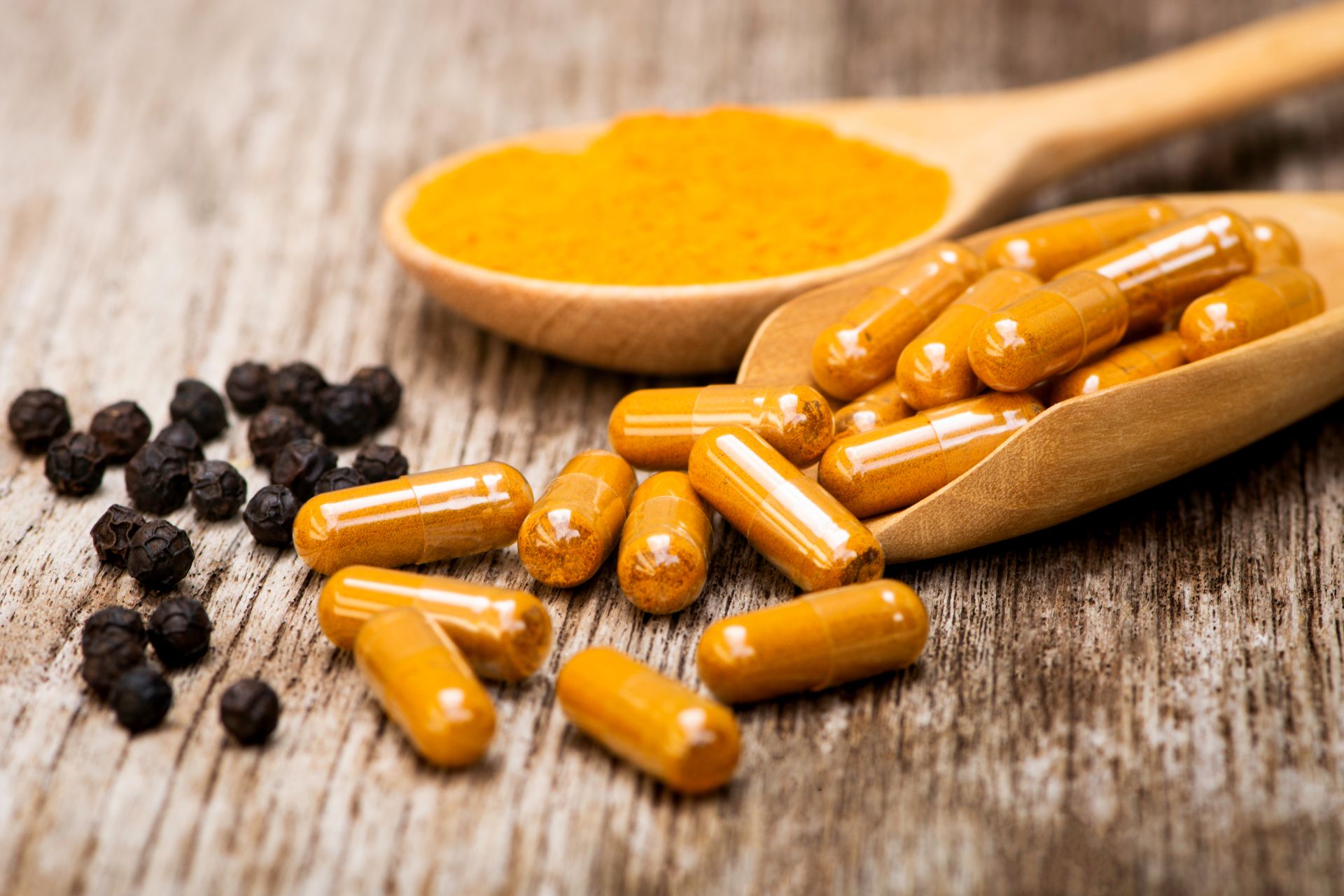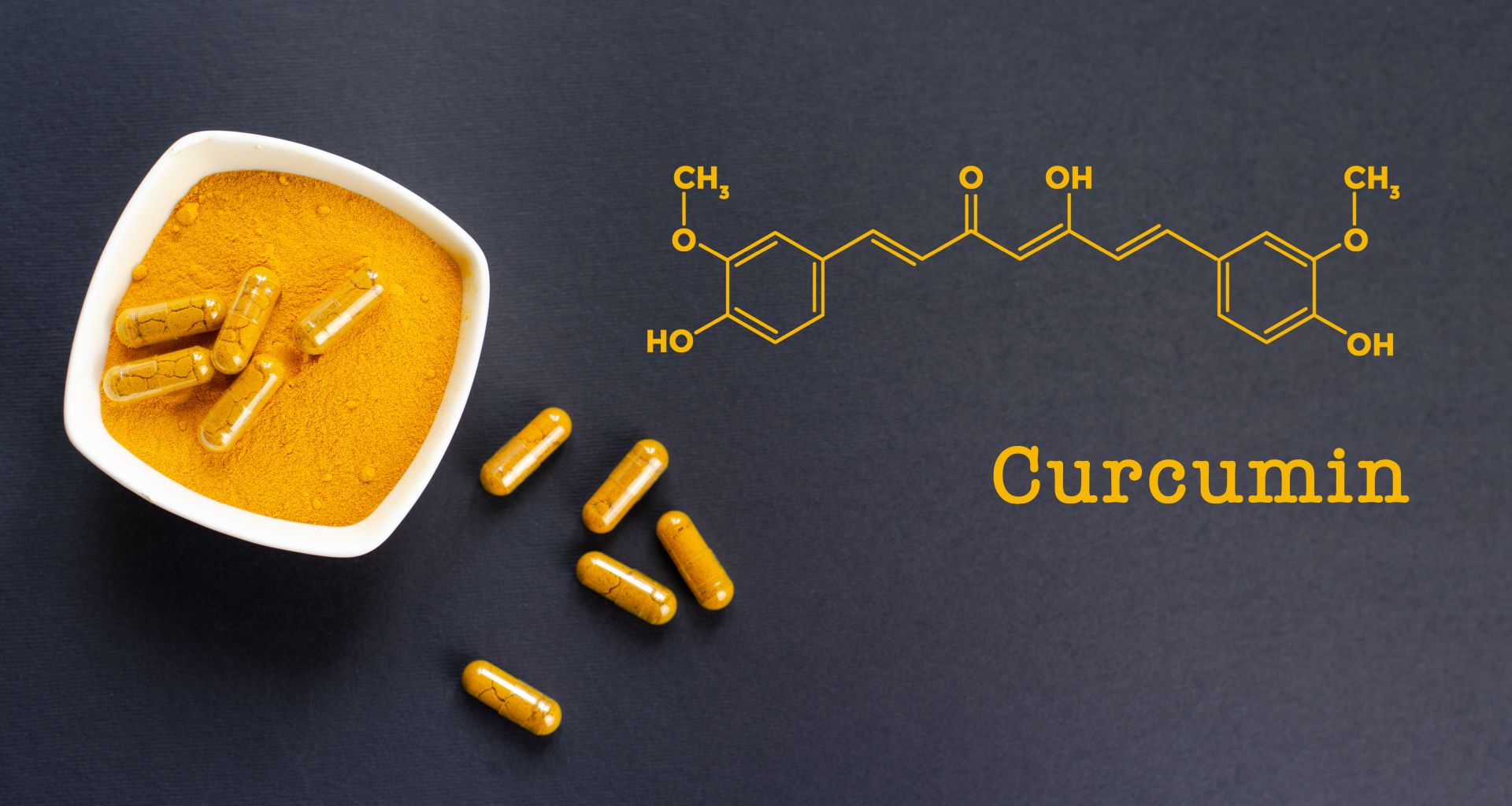
Long oyster, otherwise known as turmeric, is a perennial, rhizomatous herbaceous plant that belongs to the ginger family. Turmeric rhizomes contain curcumin, an organic chemical compound with a wide spectrum of biological and pharmacological activity. Dietary supplements containing turmeric extract (curcumin) and black pepper extract (piperine) are extremely popular today because of their broad health-promoting properties and high bioavailability.
- What is curcumin?
- Curcumin - properties
- Curcumin - bioavailability
- Curcumin with piperine - what effects does it have?
- Curcumin - dosage
What is curcumin?
Curcumin is a bioactive compound belonging to the polyphenol (antioxidant) group, which occurs naturally in turmeric rhizomes and has been widely used in Ayurvedic medicine for centuries in supporting the treatment of various health disorders. Curcumin is the main biologically active ingredient found in turmeric (a powdered yellow Indian spice), which is also found in dietary supplements. Curcumin is a fat-soluble substance that has an intense orange-yellow color, which is why it is used by food manufacturers as a food additive (colorant) labeled E100.
Curcumin - properties
Curcumin is a compound that exhibits comprehensive health-promoting and therapeutic properties. Curcumin has been shown to have antioxidant, antiradical, anti-inflammatory, antimicrobial, antiproliferative (i.e., inhibition of cell division), analgesic, antidiabetic, anti-cancer, anti-atherosclerotic, antidepressant, anti-anxiety, hepato- and neuroprotective, and immunostimulating effects.
Studies have shown that curcumin can contribute to lowering total cholesterol, low-density lipoprotein LDL (so-called "bad" cholesterol) and triglycerides in the blood, and even more so in people with lipid disorders. In addition, curcumin can reduce fasting blood glucose and glycated hemoglobin (HbA1c) levels, as well as reduce the value of the HOMA-IR insulin resistance index in pre-diabetic patients. Curcumin can increase tissue sensitivity to insulin, so it may protect against the onset of insulin resistance and type 2 diabetes.
Curcumin has well-documented anti-inflammatory properties. Regular use of curcumin has been proven to reduce inflammatory markers such as C-reactive protein (CRP), interleukin 1 (IL-1), interleukin 6 (IL-6) and tumor necrosis factor-alpha (TNF-alpha). Current research suggests that curcumin may have therapeutic effects in a number of civilization and chronic conditions, namely cardiovascular, neurodegenerative, cancer, osteoarthritis, as well as obesity, depression, diabetes and inflammatory bowel disease (especially ulcerative colitis).
Curcumin supplementation can also aid weight loss in people with excessive body fatness. Accumulating scientific evidence suggests that the use of curcumin at a dose of at least 1,000 mg per day for a minimum of two months can have a positive effect on reducing body weight, waist circumference (abdominal obesity) and visceral fat content, which are strongly associated with non-alcoholic fatty liver disease.

Curcumin - bioavailability
Curcumin is an organic chemical compound that is fat-soluble, but insoluble in water. For this reason, curcumin is unfortunately poorly absorbed by the human body. The results of experimental studies on animal models have shown that the bioavailability of curcumin is only 1%. Thus, as can be seen, one of the main problems associated with the oral use of curcumin is its low bioavailability, which appears to be caused not only by poor absorption, but also by rapid metabolism and rapid systemic elimination. In recent years, several methods have been developed to improve the absorption of curcumin from the gastrointestinal tract. The two most effective and most commonly recommended methods to increase intestinal absorption of curcumin are combining curcumin with piperine (black pepper extract) and combining curcumin with lipids. It has been proven that among a number of commercial curcumin supplements, the micellar form of curcumin had the highest absorption rate.
Curcumin with piperine - what effects does it have?
In order to improve intestinal absorption of curcumin, it is recommended to take it together with piperine, the main bioactive component of black pepper, as this combination is associated with an increase in the bioavailability of curcumin by as much as 2000%. It is recommended to combine curcumin with piperine as follows: 500 mg of curcumin and 5.0-6.7 mg of piperine three times a day, for a total of 1,500 mg of curcumin and 15-20 mg of piperine per day. The literature also suggests that in some cases high doses of curcumin in the range of 2,000 to 4,000 mg per day may be required to increase its bioavailability.
Curcumin - dosage
Based on available scientific evidence, it is indicated that curcumin exhibits health-promoting effects on the human body at doses ranging from 500 mg to 3,000 mg per day. Both higher and lower levels of curcumin supplementation can provide measurable health benefits. Curcumin should be taken with food every time (e.g., after breakfast).
Sources:
-
Askari G, Sahebkar A, Soleimani D, et al: The efficacy of curcumin-piperine co-supplementation on clinical symptoms, duration, severity, and inflammatory factors in COVID-19 outpatients: a randomized double-blind, placebo-controlled trial. Trials. 2022 Jun 6;23(1):472.
-
Pawar KS, Mastud RN, Pawar SK, et al: Oral Curcumin With Piperine as Adjuvant Therapy for the Treatment of COVID-19: A Randomized Clinical Trial. Front Pharmacol. 2021 May 28;12:669362.
-
Hewlings SJ, Kalman DS: Curcumin: A Review of Its Effects on Human Health. Foods. 2017 Oct 22;6(10):92.
-
Jakubczyk K, Drużga A, Katarzyna J, et al: Antioxidant Potential of Curcumin-A Meta-Analysis of Randomized Clinical Trials. Antioxidants (Basel). 2020 Nov 6;9(11):1092.
-
Tabrizi R, Vakili S, Akbari M, et al: The effects of curcumin-containing supplements on biomarkers of inflammation and oxidative stress: A systematic review and meta-analysis of randomized controlled trials. Phytother Res. 2019 Feb;33(2):253-262.
 ⮜ Previous article
⮜ Previous article
Proven ways to snack
 Next article ⮞
Next article ⮞